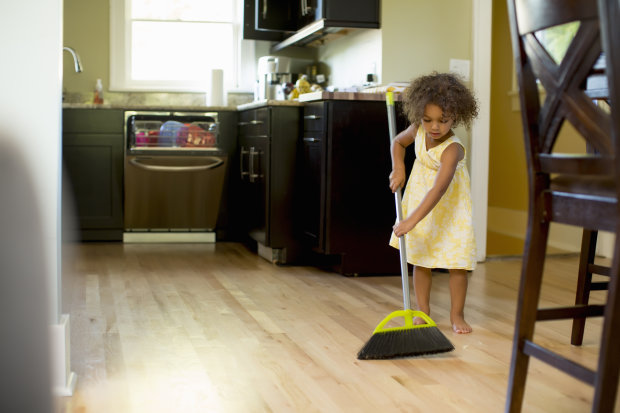Parents know kids should help out around the house. The problem is getting them to actually do it. Why is it so tough? Well, for many parents, we simply can’t stand the bickering and nagging that is required to mobilize our kids into action.
We get worn down. We don’t want another fight. We find it easier to just load the dishwasher ourselves (and, bonus, we can load it exactly the way we like).
But then another year passes and we feel resentment building over our work load. We see our children getting older, but not getting more responsible. So, the desire to get them doing some chores rises again.
Well, I say “yay” to that! But this time I want to help you so your chores really stick! Here’s how:
1. Call a meeting
If you are doing regular family meetings, just put chores on the agenda. If you are not, that is okay — just plan to have a one-off family pow wow.
2. Present the current division of labour
Write each family member’s name on a sheet of paper. Under their name list their current jobs. It should quickly become visually clear that mom and dad are doing the lion’s share of the work around the house.
3. Suggest a change and a benefit
Children have a finely tuned fairness metre. They will see that the current situation is unfair (even if they deny it or don’t say it out loud). Kids also yearn for time with their parents.
Explain that you would like to find a way to balance the load a bit. You are hoping to free up some time so you can have more family fun together. Ask if they would like that, too. Get your goals aligned as a family first.
Explain that if each child took some items off your list, the work would go faster, be more fun and then you’d have more time to do things like playing a board game or hockey in the driveway.
4. Divide and conquer
Ask each child to volunteer to take one or two items off the chore list. Assure them that this is not a life sentence — next week chores can be reassigned, rotating chores through the family so no one has to bear the full burden of toilet duty.
5. Be specific
Ensure accountability by spelling out the fine print: when will the chore be completed? Precisely what is expected? For example, when we say “clean the bathroom” what exactly is included? Toilets? Mirrors? Wastebaskets? And, importantly, what will happen if the chore is not completed as spelled out by the deadline mutually agreed upon?
When children are involved in the establishment of the rules, there is greater compliance and more goodwill when consequences need to be enforced.
Two techniques to make the implementation easier:
Use “when___, then____” statements instead of threats threats: For example: “When the playroom is picked up, then we can move on to supper.” Or, “When the recycling bins have been brought in, then I know it’s time for the family movie.”
Let life unfold: We call it a “natural consequence” when children experience the outcomes of not doing their chores without any intervention from us. For example, simply sit at the table and wait for the table setter to realize on her own that plates and cups and forks are missing. The natural consequence of failing to put your school uniform in the wash is that it doesn’t get cleaned.
When parents arrange a consequence that fits with the action or inaction, it’s called a logical consequence. For example, when guinea pig cages are not cleaned as agreed, guinea pigs need to be moved to a more caring home. Or, if bedrooms are not company-ready, play dates will have to be suspended until they are.
The trick here is to follow through. No idle threats please! Neighbours and friends are usually very happy to help out with occasional pet-sitting or play-date rearrangement, when the need arises.
Source: parent dish


